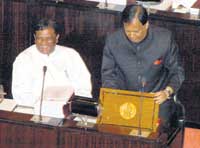
| Economic rhetoric and economic reality One of the interesting issues to look out for in the Budget is whether the consensus of the two main parties would have brought about a change in the agenda on economic reforms Time and again this column has pointed out the variance between economic rhetoric and economic reality. One of the best instances is the budget that proposes one thing and achieves another. This has been especially so with respect to fiscal consolidation that we discussed last week. Time and again budget speeches have articulated a reduction in the fiscal deficit. Each year the outcome of the budget is a much higher deficit than presented in the Budget. This has been a recurrent phenomenon for so many years. Consequently, there has been no public accountability in the public finances of the country. There was a time when parliament questioned such divergences and supplementary estimates were debated vigorously though ultimately passed by governments as they had a majority. These parliamentary devices were never totally effective, they were characterised by a parliamentarian as 'post mortems' and 'shutting the door after the horses had bolted.' Nevertheless such debate focused public attention to these increases in expenditure and public awareness was consequently drawn to them. No longer is this the case. Even this semblance of accountability appears to have disappeared.
Supplementary estimates have become routine matters that are approved hastily in a rush to finish parliamentary business. The figures in the November 16 budget are not likely to be different. In retrospect the figures would once again be fictitious. Economic reforms are similar. Time and again economic reform s are mooted and time and again they are forgotten. Sometimes owing to political pressures and objections from various quarters. When one combines lack of reform with ineffective implementation of reforms, we derive the inevitable results of economic inefficiency and stagnation. This is one of the reasons for the inability of the economy to achieve super growth rates. The government is satisfied with the growth statistics that exaggerate economic performance rather than undertake reforms that would be conducive to sustainable growth. The November 16 Budget cannot be expected to be different to its predecessors for sometime. The Finance Minister would be honest if he were to compare the budget figures presented in parliament in recent years and their outcomes. At least we hope an opposition member performs this function. A clear analysis of what budgets proposed in the past five years and what the actual outcomes have been would be most enlightening. One of the interesting issues to look out for in the Budget is whether the consensus of the two main parties would have brought about a change in the agenda on economic reforms. The government's election coalition parties had extracted promises of halting certain reforms especially with respect to the privatisation of public enterprises. It is very clear that a huge public expenditure is incurred in the running of a number of inefficient public corporations. Yet we persist in continuing to keep them in their status quo. Even earlier reform agenda have not been implemented. The latest State of the Economy 2006 report of the Institute of Policy Studies (IPS) comes out strongly on the poor record on economic reforms. The strong eloquent exposition of the problem is compelling. It says it in no uncertain terms: "In Sri Lanka, calls for economic reforms have been heard more often than they have been heeded. Since the late 1990s, reforms have more or less been held at a standstill, and where they have occurred they have been piecemeal and half-hearted. While the momentum from the earlier reforms still continue, the prospects for economic success - building for robust and sustained growth - may look uninspired unless political weight is placed firmly behind the direction of more reforms." The fear to reform and the tardiness in the implementation of reforms have been serious constraints in providing the environment conducive to economic growth. We continue to dream of higher growth rates, even predict such high rates of economic growth, but do very little to remove the constraints and bottlenecks to achieving the goals we have set before us. Now we are prone to talk about the super growth of India and China, as if talking about their achievements would raise our own economic achievements. Surely it must be clear to even the less informed among our policy makers that the foundation for their economic acceleration has been the economic reforms that they undertook. The seriousness of this issue is that the needed reforms would have an important impact on the long-term growth prospects of the country. By not undertaking reforms in a number of areas we are in fact throttling the prospects of long-term economic growth and development. As the IPS State of the Economy 2006 has argued: "The sustainability of the growth performance, therefore, needs to be looked at carefully. This entails the performance of the macro economy in ensuring stability, as well as the effectiveness and cohesion of an economic reform agenda that supports the long-term task of raising economic growth. At best, the performance on both fronts during 2005-06 has been mixed." The rhetoric in the New Budget for 2007 may address these in words but going on the basis of past experience not much can be expected on the realisation of the rhetoric. Once gain to repeat the words of the IPS, will we continue in the tradition where "economic reforms have been heard more often than they have been heeded?" |
| || Front
Page | News
| Editorial
| Columns
| Sports
| Plus
| Financial
Times | International
| Mirror
| TV
Times | Funday
Times | Kandy
Times || |
| |
Copyright
2006 Wijeya
Newspapers Ltd.Colombo. Sri Lanka. |
